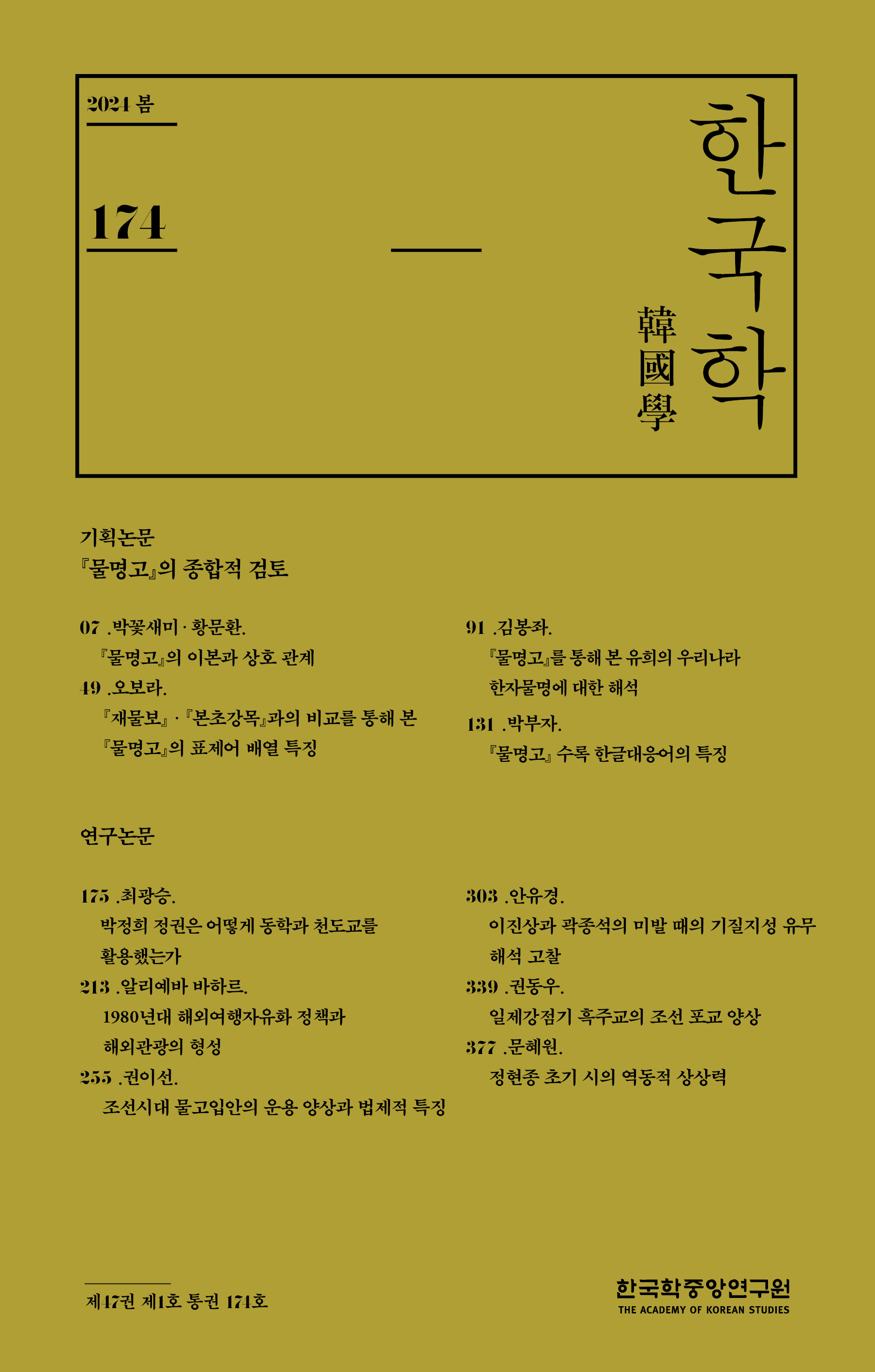
- P-ISSN 2671-8197
- E-ISSN 2733-936X
.jpg)
Hamgyeong province(咸鏡道) located at northernmost part of Korean Peninsula was the area where King Taejo, Yi Seonggye(李成桂, 1335-1408, r.1392-1398), who founded Joseon Kingdom, was born and grew up. For this reason, from the beginning of the Joseon Dynasty the historical sites of the royal family(王室史蹟) scattered here and there in Hamgyeong province had been designated in order to heighten authority of the royal family. In particular such effort was positively undertaken during the reign of King Yeongjo and King Jeongjo when strengthening of royal power was emphasized. The number of the historical sites was increased as local residents stressed close relations between their local area and the royal family in order to overcome a lack of regional history. The historical sites of the royal family were very diverse in its types, including the house of birth, outing place and altars. It is most notable that many historical sites were related to Yi Seonggye and most of them were concentrated in Hamheung(咸興) and Yeongheung(永興). Meanwhile, since Twenty Scenic Spots was chosen and included in the paintings of scenic spots of Gwanbuk(關北名勝圖) by Nam Gooman(南九萬, 1629-1711), who served as a provincial governor of Hamgyeong Province during latter half of 17th century, it had been represented continuously until end of the Joseon Dynasty. Currently existing works are divided into the paintings of royal tombs(王陵圖) which were painted for official purpose and the paintings of scenic sports(名勝圖) painted on private orders. They were passed on to posterity without any remarkable changes in its typified composition and contents. It could be, simply, ascertained that there were some differences in style and level of perfection depending on the character of the works, the age of the works, and the status of orderers and painters.
「高宗實錄」,
「世宗實錄」
「純祖實錄」
「新增東國輿地勝覽」
「英祖實錄」
「日省錄」
「正祖實錄」
「太祖實錄」
金昌翕, 「三淵集拾遺」 卷28.
南九萬, 「藥泉集」 卷28.
朴師海, 「蒼岩集」 卷9.
魏昌祖, 「北道陵殿志」.
李肯翼, 「燃藜室記述」 卷1.
正祖, 「弘齋全書」 卷15.
강석화, 「조선후기 함경도와 북방영토의식」. 경세원, 2000.
김우철 역주, 「여지도서」 27. 디자인 흐름, 2009.
김우철 역주, 「여지도서」 28. 디자인 흐름, 2009.
김우철 역주, 「여지도서」 30. 디자인 흐름, 2009.
朴晶愛, 「朝鮮時代 關西關北 實景山水畵 硏究」. 한국학중앙연구원 박사학위논문, 2011.
범선규, 「‘조선8도’의 별칭과 지형의 관련성」. 「대한지리학회지」 제38권 제5호, 대한지리학회, 2003, 686 700쪽.
楊普景, 「郡縣地圖의 발달과 <海東地圖>」. 「海東地圖(解說·索引)」, 서울大學校奎章閣, 1995, 68 73쪽.
이능화 편, 동국대학교 불교문화연구원 조선불교통사역주편찬위원회 역, 「역주 조선불교통사」 5, 하편 이백품제(二). 동국대학교출판부, 2010.
李秀美, 「《咸興內外十景圖》에 보이는 17세기 實景山水畵의 構圖」. 「美術史學硏究」 233· 234, 韓國美術史學會, 2002, 37 62쪽.
이예성, 「19세기 특정한 지역을 그린 고지도와 회화」. 박정혜·이예성·양보경, 「조선왕실의 행사그림과 옛지도」, 민속원, 2005, 53 68쪽.
이예성, 「조선후기의 왕릉도(王陵圖)」. 이성미 외 지음, 「조선왕실의 미술문화」, 대원사, 2005, 202 234쪽.
이익주, 「이성계와 전주」. 「왕의 초상, 慶基殿과 太祖 李成桂」, 국립전주박물관, 2005, 188 199쪽.
李勛相, 「조선 후기 지방 파견 화원들과 그 제도, 그리고 이들의 지방 형상화」. 「東方學志」 제144집, 연세대학교 국학연구원, 2008, 305 366쪽.
張裕昇, 「조선 후기 서북 지역 문인 집단의 성격 평안도와 함경도의 지역 정체성의 차이를 중심으로」. 「震檀學報」 101, 진단학회, 2006, 391 425쪽.
조인수, 「조선초기 태조 어진(御眞)의 제작과 태조 진전(眞殿)의 운영 태조, 태종 대를 중심으로」. 「미술사와 시각문화」 제3호, 사회평론, 2004, 116 153쪽.
崔完秀, 「謙齋 鄭敾 硏究」. 「謙齋 鄭敾 眞景山水畵」, 범우사, 1993.
韓國佛敎硏究院, 「北韓의 寺刹」. 일지사, 1978.
「우리 땅, 우리의 진경」. 국립춘천박물관, 2002.
「조선을 일으킨 땅, 함흥」. 국립중앙박물관, 2010.
「화가와 여행」. 서울대학교박물관, 2004.